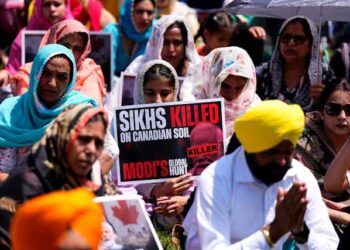Mario Peucker, Victoria University
Footballer Sam Kerr has been charged with “racially aggravated harassment” over a January 2023 incident in which she allegedly insulted a London police officer. According to widespread media reports, she is said to have called the officer a “stupid white bastard”.
Kerr has pleaded not guilty to the charge and has reportedly denied using the word “bastard”.
According to section 33 of the British Crime and Disorder Act, to be found guilty of such an offence, the conduct would have had to cause – or have intended to cause – alarm or distress.
Regardless of the court’s ultimate verdict, one big question seems to occupy the minds of many: does the phrase attributed to Kerr constitute racism?
Kerr was born in Western Australia, and has Indian ancestry on her father’s side. Can she be racist towards a white person, and more specifically to a white police officer?
Assuming it is true Kerr used the term “white”, there is a racial element. But “racial” is not the same as “racist”.
Definitions of racism
It is important to note here that “race” is not a biological category (there is only one human race). Race is a social construct, invented and cemented centuries ago to legitimise colonial atrocities, oppression and forms of subjugation including slavery.
There are many definitions of racism, but there has been a broad consensus for decades that racism is more than “just” prejudice and discriminatory behaviour. It is not simply a matter of less favourable treatment of an individual or group of people based on their actual or ascribed ethnic background, skin colour, origin or related characteristics.
Racism also reflects and manifests as systemic exclusion and marginalisation based on historically rooted power imbalances and racial hierarchies that put white people at the top.
To put it very simply, the scholarly (if not the legal) definition is that “racism equals power plus prejudice”.
In a vicious cycle, everyday racism and discrimination are shaped and justified by racial hierarchies, while they operate continuously in a way that cements power imbalances and racial marginalisation.
This may sound a bit abstract, but if we do not recognise this power dynamic, we trivialise racism as little more than name-calling. We will fail to understand how racism operates and how it continues to affect people from racially marginalised groups in their daily lives.
One way to illustrate the systemic nature of racism is to look at the persistent lack of representation of people of colour in leadership positions in the corporate sector, the media and governments in Australia and elsewhere.
In the United Kingdom, where the alleged incident occurred, institutional racism – including within the police force – has been recognised since the release of the Macpherson report in 1999. It was reaffirmed in 2023 by the Baroness Casey Review, despite some political pushback.
The review found “Met officers are 82% White and 71% male, and the majority do not live in the city they police. As such, the Met does not look like the majority of Londoners.”
Reverse racism?
Anti-discrimination legislation in the UK and Australia usually does not speak explicitly of “racism”. It outlaws certain acts that are motivated, partially or wholly, by a person’s race (or other personal identity markers).
Legislators introduced these laws with the intention of enhancing the legal protections for those who were considered vulnerable to racism. In Australia, for example, the Racial Discrimination Act (1975) is often celebrated as a legal cornerstone in the country’s journey away from its racist “White Australia” history towards a modern multicultural society.
The United Nations’ International Convention on the Elimination of All Forms of Racial Discrimination (1965), ratified by Australia in 1975 and the UK in 1969, makes its intention explicit when it calls on all state parties to make it an offence to disseminate “ideas based on racial superiority”.
The issue of power structures should also be seen through an institutional lens. It is difficult to imagine a person on the streets of London with more institutional power than a white police officer.
Being called a “stupid bastard” might hurt someone’s feelings. But while I’m in no position to judge whether Sam Kerr’s alleged actions have caused “distress” to the officer – as the law would require – labelling the incident as racist is clearly not in line with what racism means.
Such a definition would not align with the concept’s institutional and systemic dimensions. It is not what anti-discrimination laws were intended to outlaw.
Claims of anti-white or “reverse” racism are based on a shallow, misguided and inaccurate understanding of what racism really constitutes.
If Kerr’s court case fails to acknowledge the deeper purpose of anti-racism legislation by equating “racial” with “racist”, it risks setting a highly problematic precedent that would undermine efforts to acknowledge and tackle racism in all its forms.
What would be the message to those millions of people in the UK, Australia and elsewhere who have to face racism every day without recognition of the harm it causes and without the support and capacity to sue the perpetrators?
What would they think about their right to equality and their place in society?
Mario Peucker, Associate Professor and Principal Research Fellow, Institute for Sustainable Industries and Liveable Cities, Victoria University
This article is republished from The Conversation under a Creative Commons license. Read the original article.











